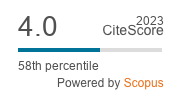Failed handoffs in collaborative Wi-Fi networks
Cesar Hernandez, Diego Giral, C. Salgado
Abstract
Cognitive radio networks enable a more efficient use of the radioelectric spectrum through dynamic access. Decentralized cognitive radio networks have gained popularity due to their advantages over centralized networks. The purpose of this article is to propose the collaboration between secondary users for cognitive Wi-Fi networks, in the form of two multi-criteria decision-making algorithms known as TOPSIS and VIKOR and assess their performance in terms of the number of failed handoffs. The comparative analysis is established under four different scenarios, according to the service class and the traffic level, within the Wi-Fi frequency band. The results show the performance evaluation obtained through simulations and experimental measurements, where the VIKOR algorithm has a better performance in terms of failed handoffs under different scenarios and collaboration levels.
Keywords
cognitive radio; failed handoff; GSM; MCDM; spectral decision; wireless networks;
DOI:
http://doi.org/10.12928/telkomnika.v18i2.14894
Refbacks
There are currently no refbacks.
This work is licensed under a
Creative Commons Attribution-ShareAlike 4.0 International License .
TELKOMNIKA Telecommunication, Computing, Electronics and Control Universitas Ahmad Dahlan , 4th Campus+62 274 564604
<div class="statcounter"><a title="Web Analytics" href="http://statcounter.com/" target="_blank"><img class="statcounter" src="//c.statcounter.com/10241713/0/0b6069be/0/" alt="Web Analytics"></a></div> View TELKOMNIKA Stats


